Your donation will support the student journalists of Carmel High School - IN. Your contribution will allow us to purchase equipment and cover our annual website hosting costs.
All Falls Down: Community members feel both positive, negative effects of government shutdown, resulting domino effect
February 22, 2019
Last month, junior Korryn Reichard walked into her SRT room to grab her things, talking with her friends as they exited. While Reichard was at school, her father went to work but was not receiving a paycheck. Reichard’s father is a federal employee, and last month, he worked for 35 days without pay during the government shutdown. Reichard said due to the shutdown, it became difficult for her family to do things they would normally be able to do.
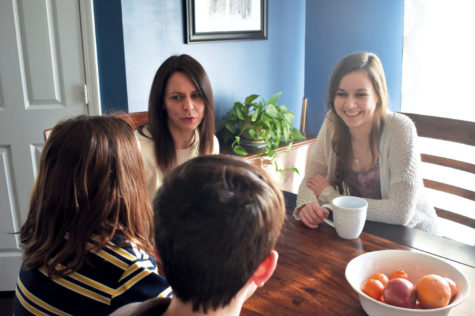
FAMILY TIME:
Junior Korryn Reichard talks with her family after school. Reichard said because of the government shutdown, they were not able
to spend as much time with her dad.
“We aren’t able to do as much as we want to, which is hard because I have three siblings,” Reichard said. “There’s a lot of us and there’s a lot of activities we do that my mom has to pay for. It’s also kind of annoying because my dad (was) gone a lot, so he’ll be gone the entire time, but he (was) not being paid for being gone. So, we lose family time, too.”
The latest government shutdown—the longest one in history—caused nine federal departments and agencies to cease activity for 35 days due to a lack of funding. However, it affected more than just those employees, as shown by Reichard’s situation.
In other words, it created a “domino effect.” The Cambridge Business English Dictionary states that the domino effect is a “situation in which one event causes a series of related events, one following another.” Once one domino falls, the rest behind it fall. One immediate effect of the government shutdown was that 800,000 federal employees had their paychecks withheld, which led to a reduction in quarterly economic growth by 0.13 percent for each week of the shutdown, according to The New York Times. Government teacher Michael O’Toole said these two effects go hand-in-hand.
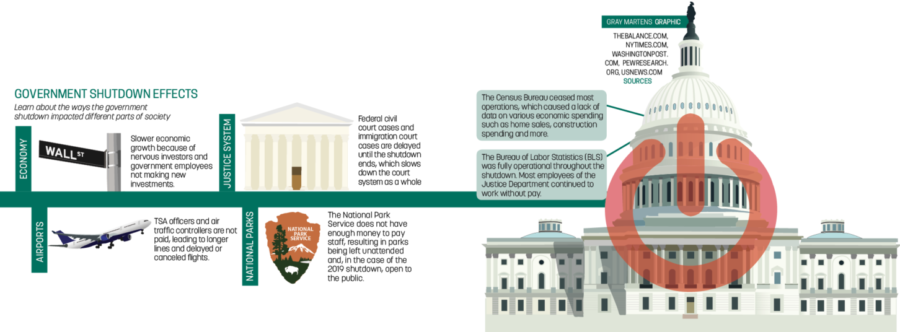 “In the short run, the people that weren’t getting paid—approximately 800,000 to one million—they aren’t spending their money, which that’s how the economy works: by people continuing to spend,” O’Toole said. “In the short run, it could’ve had ripple effects in groceries, in car payments, in mortgage payments. While if people had to take out loans or ran out of savings, it could have a longer-term effect on the economy.”
“In the short run, the people that weren’t getting paid—approximately 800,000 to one million—they aren’t spending their money, which that’s how the economy works: by people continuing to spend,” O’Toole said. “In the short run, it could’ve had ripple effects in groceries, in car payments, in mortgage payments. While if people had to take out loans or ran out of savings, it could have a longer-term effect on the economy.”
The domino effect can also have positive repercussions as well. Both of junior Taylor Carlson’s parents are federal employees, and although they had a trust fund to fall back on during situations like the shutdown, their neighbors were there to provide help.
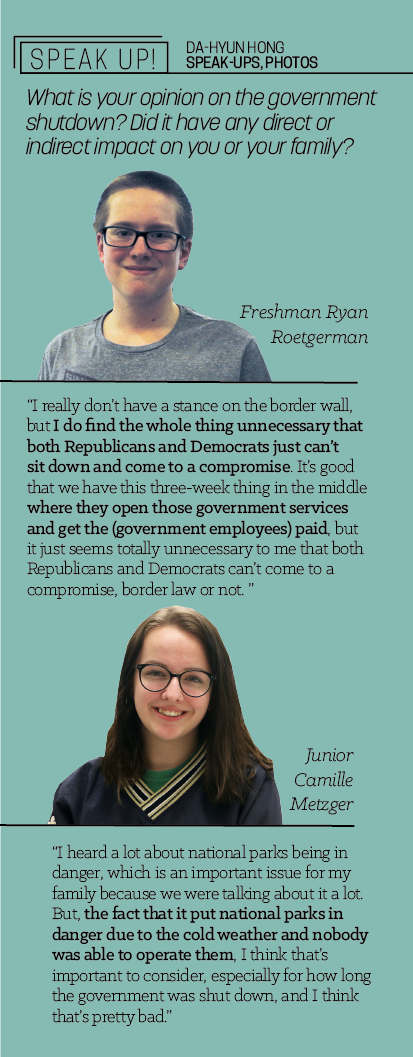 “I do know that usually when we use the trust fund—it’s happened a few times before—our neighbors help out, especially with buying groceries and paying for gas,” Carlson said. “Being able to adjust to whatever situation you’re being put in, for families like mine and others that can’t really help it, there are ways that you can still function normally. There are other people you can count on, too.”
“I do know that usually when we use the trust fund—it’s happened a few times before—our neighbors help out, especially with buying groceries and paying for gas,” Carlson said. “Being able to adjust to whatever situation you’re being put in, for families like mine and others that can’t really help it, there are ways that you can still function normally. There are other people you can count on, too.”
In addition to individual contributions, some businesses worked to help during the shutdown. Pizzology’s owner Neal Brown decided to give free food to those affected by the shutdown, and that decision, according to Carlee Hunter, assistant manager at Pizzology, caused others to join in.
“I know once Neal had proposed to make this happen, a couple other businesses started doing it as well, and that’s the domino effect,” Hunter said. “Even some of our regulars that we’ve taken care of for years work for the government, and we were able to provide free meals for them and their families. And there wasn’t a minimum amount for them; they could come in multiple times a week because they weren’t being paid.”
Reichard said she agrees that aid from local businesses has been a positive effect of the government shutdown and that it has helped bring the community together during a time of need.
“I think with what Pizzology was doing, just doing the best thing you can in this situation, like giving a helping hand when possible (is important),” Reichard said. “I know a lot of people are single parents or both spouses work for the government, so a good resource like restaurants giving away free food is so needed. A lot of people can take advantage of that and feed their families, so it’s one of the positive effects.”
Hunter said while Pizzology has done its best to help government employees, the restaurant has received lots of positive feedback from the community. According to Hunter, the decision to give free food to those affected has brought in more foot-traffic and the customers have given back to them as well through their own acts of kindness.
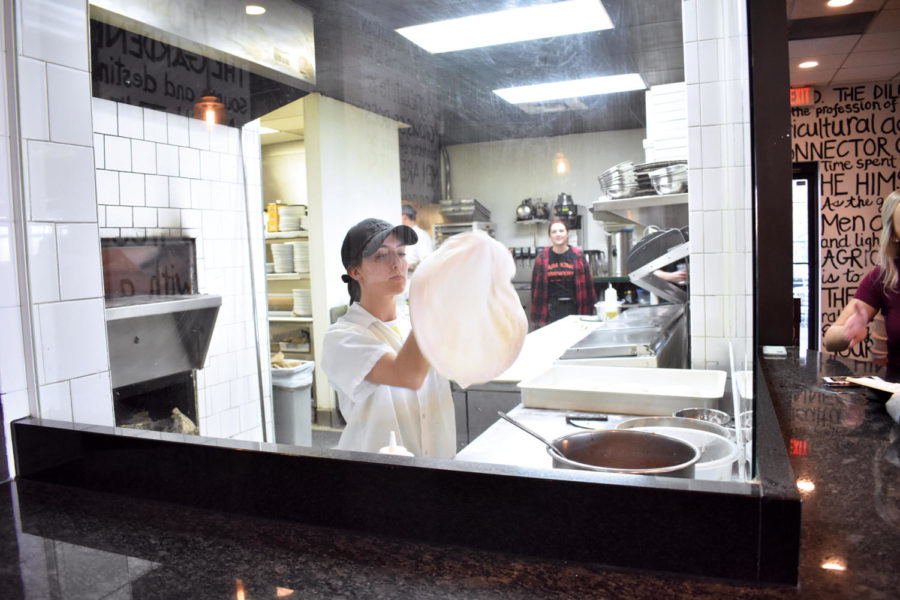
PIZZA PARTY: A Pizzology employee spins a pizza crust. Pizzology assistant manager Carlee Hunter said during the shutdown, the restaurant provided meals to numerous government workers and their families to help them while they weren’t getting paid.
“We even had some of our regulars donating money to help match the costs of us giving away free food. Even the government employees that would come in, they were so genuine and sweet. One big group that came in had brought us home-made cookies for the entire staff,” Hunter said. “Guests have written us handwritten letters and given them to employees and just been so grateful and thankful. (They) said that they’ll always have our business, like they’re always going to come back.”
While many domino-effect events resulted from the shutdown, not every effect was visible in Carmel. According to O’Toole, because Carmel only has a small pocket of federal employees, as opposed to areas of the country like Washington D.C., a lot of the major effects may go unnoticed by those in the community.
“We are lucky to live in Carmel; it’s a great place, but a lot of students and other people I’ve talked to have said they don’t understand what the big deal was about the shutdown, but again (they’re) not federal employees,” O’Toole said. “We don’t have a huge amount of federal employees in this direct area, so it’s easy to miss what that effect could do to families: food and health assistance, missing one mortgage payment for most of America is actually pretty detrimental. So that’s what I would look at it. Try to understand what it’s like for someone that it did affect.”
Reichard said she agrees that the impacts both during and following the shutdown have easily gone unacknowledged in Carmel not only because not as many people work for the government, but also because of the financial status of the community.
“I feel like especially in Carmel, the effects aren’t always as visual because there’s a lot of money here, but it’s definitely more visible in places where there isn’t such a high concentration of people with so much money,” Reichard said.
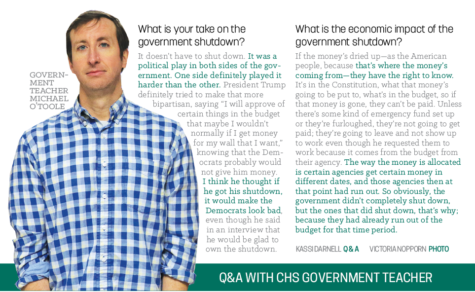 Ultimately, Reichard said despite the many effects of the government shutdown, she has learned how much one person’s decision can affect others.
Ultimately, Reichard said despite the many effects of the government shutdown, she has learned how much one person’s decision can affect others.
“It’s definitely given me a good reminder that if you are in a position with that much power, you need to make sure you’re thinking of what your actions could cause,” Reichard said. “One person just trying to do one thing that they want can affect so many people so negatively.”

Editor’s note: as of press deadline President Donald Trump had not signed a bill that would prevent another government shutdown
